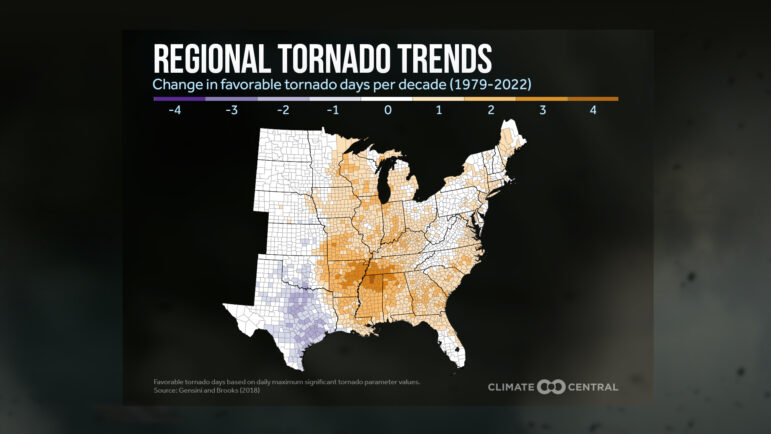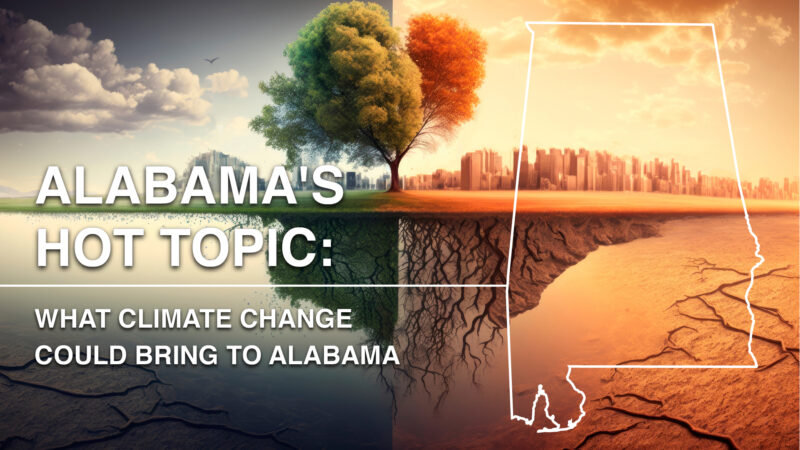The connection is growing between climate change and big storms
This story is part of a series “Alabama’s Hot Topic: What Climate Change Could Bring.” Read additional stories in the series.
On January 12, 2023, Selma took a direct hit from a tornado. Aaron Roper was at work that morning.
“It went from being just a nice, warm day,” he said. “Then all of a sudden, it seems like dark clouds just began to transition into our area.”
Along with several coworkers, Roper took cover in an interior room in his office while the storm pummeled the area around him. He then got word his house had been hit and headed home to check on his wife and child.
“Three-quarters of the roof was gone, and so I immediately walked in the house, checked on everybody,” he said.
Roper said his wife and child were physically OK, but they were shocked.
“Quite frankly, everybody was shaken up,” he continued. “Because being at home during something like that — not that you don’t take it serious — but you just don’t think it’s going to happen to you. And when it gets you, you’re shaking, you’re frantic.”
Amazingly, no one in the city was killed, but with winds clocked at 130 mph, the EF2 twister destroyed homes, churches, businesses, and just about everything else in its path.
A tenuous connection to twisters

There was a time when severe storms, like the one that hit Selma this winter, were the exception. Now tornado outbreaks from November to February are happening here in the South more frequently. Winter provides increasingly favorable conditions for tornadoes in the Southeast.
According to Harold Brooks, a senior research scientist at the National Severe Storms Laboratory, sea surface temperatures across the Gulf of Mexico are increasing, helping generate the warm, humid surface air that feeds severe thunderstorms across the central and eastern U.S. That warm air is, in effect, the missing link that makes conditions in winter favorable to the formation of tornadoes.
“The change of the wind with height that helps organize storms — that makes them more likely to rotate in a way that produces a tornado. That maximizes in the wintertime,” he said.
Brooks noted that the number of tornadoes has increased by about 10% in the Southeast since the 1980s. But he emphasized researchers have not yet connected these changes to climate change.
“The presence of greenhouse gases in the atmosphere leads to the warming of the planet, and we’re seeing changes in the global temperature that are happening faster than we’ve seen in the in the geologic record. The issue with severe thunderstorms is that the connection isn’t completely straightforward,” Brooks said. “We’re not really sure if it’s climate change. There’s a good chance that it is, but it’s really difficult to make the chain complete from the planet warming to the change in tornado occurrence that we’ve observed.”
Hurricanes and climate change
When it comes to hurricanes, the connection is a little more straightforward. Climate change is causing sea levels to rise, through ice sheets and glaciers melting, plus warmer seawater expands.
A report released this spring by an international team of researchers out of Tulane University shows that sea levels along the Gulf and Southeast coasts have risen by about half an inch per year since 2010. That’s about three times more than the global average.
Brian Dzwonkowski is a professor at the University of South Alabama and a senior marine scientist at the Dauphin Island Sea Lab. He said those few extra inches can be critical.
“If you’re in a storm surge situation where you have a hurricane coming ashore and there’s high water levels from the storm surge, that may make the difference between a house flooding and a house not flooding,” Dzwonkowski said.
Sea surface temperatures hit record highs this year and are expected to warm even more by this fall. Dzwonkowski pointed out that warm waters are a big factor in fueling hurricanes, just like they are with land-based storms.
“The warmer the ocean gets, the more energy hurricanes can pull out of the ocean,” he said. “And so a warming ocean means more powerful storms.”
Warmer waters, like those of the Gulf, also feed more moisture to storms, leading to more rainfall, especially when hurricanes make landfall and stall. Plus those balmy waters can cause storms to rapidly intensify, causing them to be even more destructive, like what happened with three recent hurricanes: Sally, Michael, and Ian.
“I think there’s a lot of question marks there about how livable the coastal environments going to be over the next 30 to 40 years,” Dzwonkowski said.
Both Dzwonkowski and Brooks emphasized while changes in hurricanes and tornadoes can’t be definitively tied to human-caused climate change, the data is beginning to show a connection that needs to be taken seriously.
Park Fire in California could continue growing exponentially, Cal Fire officer says
Cal Fire has confirmed that over a hundred structures have been damaged in the Park Fire, which grew overnight near Chico, Calif. Difficult firefighting conditions are forecast through Friday night.
Checking in with Black voters in Georgia about the election, now that Biden is out
Some voters who could be key to deciding who wins Georgia. What do they think about Vice President Harris becoming the frontrunner in the race to be the Democratic nominee?
Tahiti’s waves are a matter of ‘life and death’ for surfing Olympics
Tahiti's Teahupo'o wave has a slew of riders for the Paris 2024 Olympics. NPR finds out why it's called one of the most dangerous waves.
Researchers are revising botanical names to address troubling connotations
Since the mid-1700s, researchers have classified life with scientific names. But some of them have problematic histories and connotations. The botanical community is trying to tackle this issue.
A spectacular opening ceremony wowed a global audience despite Paris’ on-and-off rain
The Paris Olympics opening ceremony wowed Parisians, fans and most everyone who was able to catch a glimpse of thousands of athletes floating down the Seine to officially begin the Games.
Kamala Harris faces racism and sexism as she moves closer to presidential nomination
As Vice President Kamala Harris ramps up her campaign for president, Republicans are trying out new — and old — attacks focused on her race and gender, including calling her a "DEI candidate."


